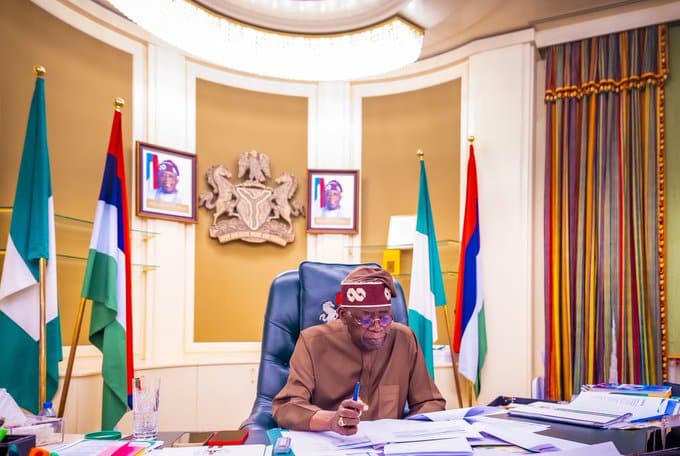
President Bola Ahmed Tinubu’s proposed tax reforms are sparking heated debates across Nigeria, particularly within northern political circles.
The new tax measures, part of a sweeping reform package, aim to overhaul Nigeria’s tax administration and streamline revenue collection processes. However, the initiatives are facing substantial opposition, with northern governors and members of the National Assembly divided over the potential impact on the region.
Reports indicate that governors from seven North-West states, six North-East states, and two additional governors from North-Central are leading the charge to resist Tinubu’s tax policies. These governors argue that the reforms, which include a range of legislative proposals, could further strain the economic conditions in northern states, which are already grappling with poverty and limited infrastructure. According to inside sources, these governors have actively engaged with influential traditional and religious leaders to pressure key figures in the National Assembly to stymie the bills’ advancement.
While the opposition within the North is significant, it’s not unanimous. Four northern governors, three from the ruling All Progressives Congress (APC) and one from the opposition Peoples Democratic Party (PDP), have voiced support for the president’s tax policies, viewing them as a necessary step to stabilize Nigeria’s finances and reduce the country’s dependency on oil revenue. These proponents argue that the reforms could lead to more efficient tax collection and equitable resource allocation across the country.
Yet, opposition is notably strong within the National Assembly. Sources reveal that lawmakers are being urged by powerful regional leaders to take a firm stance against Tinubu’s tax bills. Presiding officers from the North-West are reportedly facing pressure to join the dissenting governors, with various political and religious figures being called upon to sway their decisions. It’s unclear whether these officers will ultimately side with the opposition, but the pressure campaign has introduced a new layer of complexity to the legislative process.
Prominent among the dissenters is Senator Mohammed Ali Ndume, a former Senate Leader who has publicly condemned the tax bills as harmful to northern interests. Ndume argues that the reforms, especially those that propose increased taxes, are “dead on arrival” and would impose excessive financial strain on Nigerians. He has stated that the timing of these reforms is inopportune, given the economic hardships many Nigerians currently face.
“The middle class in Nigeria is shrinking rapidly,” Ndume has stated in recent interviews. “Many people are already struggling to meet basic needs. It doesn’t make sense to impose more taxes before addressing fundamental issues like employment, wages, and economic stability. You can’t expect people to pay more when they’re barely getting by. Before talking about tax hikes, we need to create a society where citizens have sufficient income and can manage additional expenses.”
Ndume’s criticisms have resonated with other northern lawmakers, some of whom are reportedly working behind the scenes to obstruct the bills. Although several senators have refrained from making public statements against the reforms, insider reports suggest that private meetings and discussions aimed at countering the tax measures are taking place.
In response to the backlash, President Tinubu has reaffirmed his commitment to the proposed reforms, stating that they are essential for Nigeria’s economic restructuring. Despite the growing resistance, he has conveyed a willingness to consider amendments based on legislative feedback, signaling an openness to compromise if necessary. According to Tinubu, these reforms are designed to simplify Nigeria’s complex tax structure, eliminate redundant tax policies, and create a standardized system that will make tax collection more effective and transparent.
The tax reform package includes several key pieces of legislation, each intended to address specific issues within Nigeria’s tax administration. The Nigeria Tax Bill seeks to reduce redundant taxes that burden businesses and citizens alike, while the Nigeria Tax Administration Bill aims to standardize tax processes across all states. Additionally, the Nigeria Revenue Service (Establishment) Bill proposes to transform the Federal Inland Revenue Service (FIRS) into a modernized revenue agency, and the Joint Revenue Board Establishment Bill outlines the creation of a centralized tax management body.
As the legislative debate unfolds, Nigeria watches closely to see whether Tinubu’s administration can push these reforms through or if resistance from the North will ultimately stall their progress. The outcome of this legislative struggle could have long-lasting implications for Nigeria’s economy and the balance of political power across the nation.





